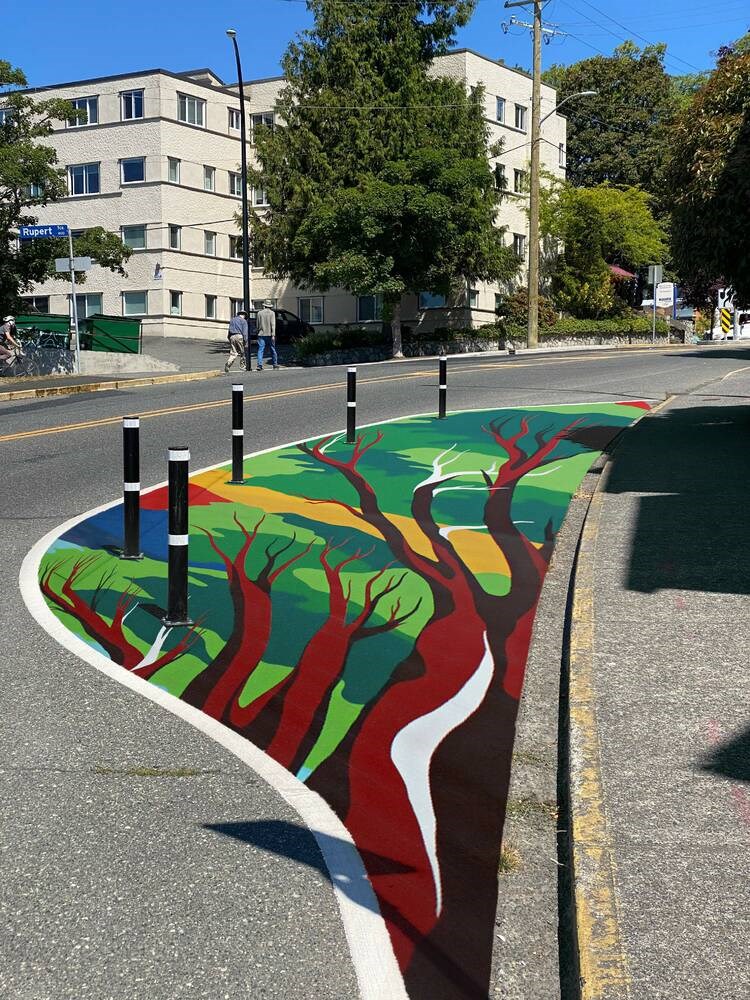The City of Victoria is awarding just over $54,000 to six community-led projects picked by the community as part of its participatory budgeting initiative.
The initiative gives community members the opportunity to vote for projects they want to see funded.
This year’s theme is Neighbourhood Spaces, with projects that encourage social connection and belonging, community identity and expression, a connection with nature and community resilience.
The winning candidates include a mural project, a community hub, an artist billboard, live pop-up performances and an outdoor movie night.
“This is what empowering the community looks like in action,” said Mayor Lisa Helps.
The projects include:
• Lower Yates Mural Project, $6,500 — Greater Victoria Coalition to End Homelessness. Youth who live at the Lighthouse, a supportive housing project, will create a community art piece for Waddington Alley.
• Madrona Community Hub at Dockside Green, $2,500 — Anne Glover. A neighbourhood space will be transformed into a community hub for residents and the public, complete with a little free library, a community notice board and a heritage marker.
• BIPOC Artist Billboard in Old Town/Downtown, $5,000 — Victoria Arts Council. The artwork of a local Black/ Indigenous/Person of Colour artist will be featured on a billboard on the Victoria Arts Council building.
• Curbside Colour, $15,750 — Greater Victoria Placemaking Network. Bright, meaningful designs by Indigenous artists will be added to two traffic-calming locations on Victoria streets to create joyful places for residents and visitors to pause.
• You Are Here Pop-Up Docs, $20,000 — Theatre SKAM Association. This project brings live performances featuring short digital documentaries, shadow plays and animated shorts to Victoria neighbourhoods, exploring the history of the land.
• Picture Nights in Oaklands, $4,830 — Oaklands Community Association. The community will be asked to vote on a film celebrating diversity that will be screened at an event at Oaklands Park.
• For more information, go to engage.victoria.ca/pb.
Anti-racism data and cultural association
The Bangladesh Canada Cultural Association is among 70 community organizations across the province receiving grants for anti-racism data collection.
The cultural association will receive $15,000 to host two community engagement workshops in Saanich and Victoria to develop recommendations for how government should use and collect race-based data. The funding will also pay for policy and programming related to anti-racism initiatives.
“We made a commitment to move forward on anti-racism data legislation in partnership with communities and I’m thrilled to see so many organizations stepping up to support this work,” said Rachna Singh, Parliamentary Secretary for Anti-Racism Initiatives. “I look forward to joining some of the community engagement sessions to hear first-hand their thoughts on how best to build and implement the legislation to support our work to address systemic racism and barriers in government programs and services.”
Organizations are holding engagement sessions expected to finish at the end of the month. Projects range from in-person events to webinars that will engage an estimated 1,500 people.
The province is developing anti-racism data legislation with Indigenous partners, based on input over several years from stakeholders, including the B.C. Human Rights Commissioner, racialized communities and Indigenous organizations.
For more information on what to do if you see or are the victim of a hate crime, go to resiliencebc.ca.
Oak Bay Rotary donates to Threshold Housing
The Oak Bay Rotary Club recently presented Threshold Housing Society with a $10,000 cheque to help youth access post-secondary education.
The society provides safe housing, support services and a community to at-risk youth, who don’t often get to make the dream of completing high school or going to a post-secondary institution a reality.
The service club previously helped four youth with their educational pursuits, with one finishing a nursing degree, while others were able to connect to the right technology to complete their homework, finish high school classes and complete their General Educational Development test, which certifies high school completion.
Threshold supports youth ages 15 to 24 and currently operates 48 units of youth-focused housing spread between four properties and 18 apartments.
For more information, go to thresholdhousing.ca.
Honours for Camosun student
Katie Manomie, a student in Camosun College’s Indigenous Family Support program, has received this year’s B.C. Lieutenant Governor’s Medal for Inclusion, Democracy and Reconciliation.
The annual award recognizes an outstanding student enrolled in a post-secondary program who has excelled in their studies while contributing to the life of their institution or community by promoting inclusion, democracy and reconciliation.
Manomie, a second year student, is an Inuk woman born in Iqaluit, Nunavut.
She was part of the “Sixties Scoop,” when Indigenous children were removed from their communities through the 1960s and adopted into predominantly non-Indigenous families, leaving many with a lost sense of cultural identity.
“I feel a great sense of honour and responsibility to receive this award,” said Manomie. “I am incredibly grateful to all of the instructors, advisors and my classmates from Camosun. I have learned a great deal from each one of these important Indigenous people.
“I was never taught about my Inuk/Indigenous heritage beyond what I learned in the public school system. In high school, I experienced a lot of racism, had a hard time attending and started to abuse drugs and alcohol. I also experienced homelessness, which ultimately affected my ability to finish high school.”
During her first semester, Manomie received an Inspire Award and the Spirit Award from Camosun for students studying family support. Because of how much she helps her classmates, she has been coined the “auntie” of the program.
She plans to enroll in the Indigenous Studies diploma program at Camosun next fall.
“I look forward to learning how to decolonize my worldviews, how to walk in both worlds, and how to advocate for my people,” she said. “I have been able to live my true, authentic self since I started at Camosun, and I am finally able to learn Indigenous ways of life.”



